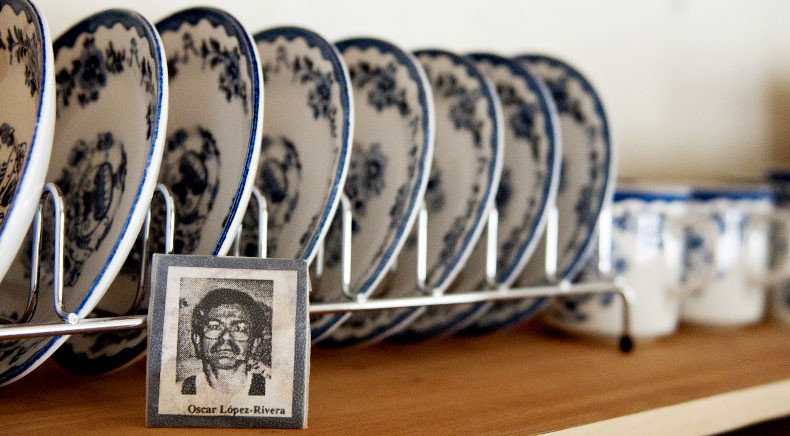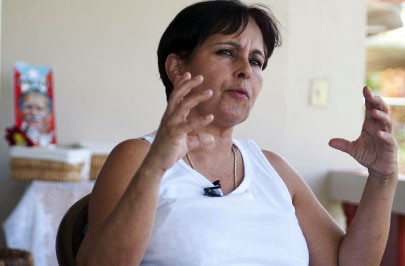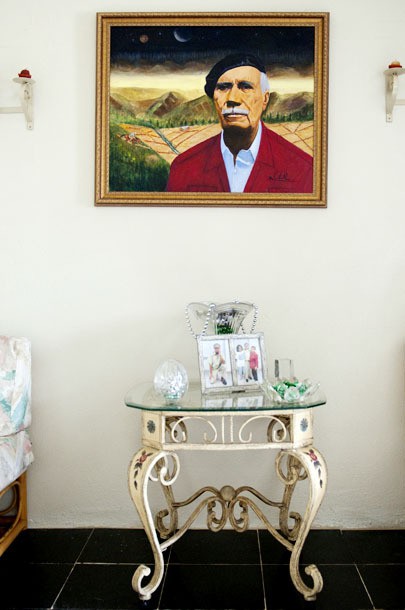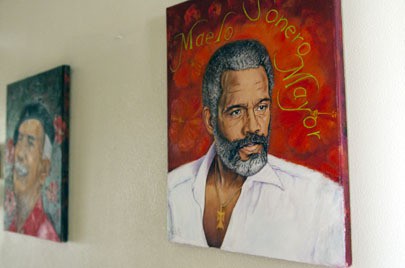Violent Campaign for Puerto Rican Independence Shatters Families on Both Sides of the Fight

By Maryann Batlle
Cronkite Borderlands Initiative
SAN SEBASTIAN, Puerto Rico -- Above her refrigerator, in her home in northwest Puerto Rico, Babbie Lugo has a shelf full of blue-patterned, white plates. She put them there so no one would touch them.
The plates were a gift to her grandmother from her uncle Oscar Lopez Rivera, who is serving a 70-year sentence in federal prison for his role in a violent campaign for Puerto Rico’s independence.

Babbie Lugo on her patio with a photo of her uncle, Oscar Lopez Rivera, in the background. Rivera was convicted for seditious conspiracy and has been imprisoned for 31 years. Photo by Molly J. Smith |
Lopez Rivera, 69, was arrested in a Chicago, Ill., suburb in 1981 after being on the run from the Federal Bureau of Investigation for about five years.
When he was captured, Lugo’s grandmother packed the plates away in a box and vowed that the next meal they touched would be the one to celebrate her son’s release. But while she waited, age wore down her body and Alzheimer’s took her memories. She died in 1997.
Lopez Rivera is spending his 31st year as an inmate at a medium-security federal prison in Terre Haute, Ind. -- about 1,200 miles from his hometown of San Sebastian, Puerto Rico, where his niece Lugo waits to fulfill his mother’s wish.
FBI agents said Lopez Rivera was a prominent member of Fuerzas Armadas de Liberacion Nacional, which is Spanish for Armed Forces of National Liberation.
FALN, as the group was known, was a Puerto Rican separatist group that bombed U.S. civilian targets to draw attention to its quest for the island’s independence in the mid-1970s and early 1980s.
Lopez Rivera’s family and supporters claim this year’s anniversary makes him the longest-serving U.S. political prisoner in Puerto Rican history. They want President Barack Obama to grant him clemency. Lopez Rivera declined a clemency offer from President Bill Clinton in 1999 because he didn’t agree with the conditions, which included parole. The clemency offer was accepted by 11 other FALN members.
Clemency remains the only way that Lopez Rivera can be released before his sentence ends in 2023. He would be 80 years old then.
Another Set of Empty Plates
Detractors say that Lopez Rivera is a remorseless, dangerous terrorist who should not go free.
In New Jersey, one such man remembers a different set of empty plates.
On Jan. 24, 1975, Joe Connor saw his father, Frank, for the last time.
Joe Connor and his older brother, Tom, had just turned nine and eleven, respectively, and the family was supposed to celebrate those milestones that evening when Frank Connor got home from his job at a major Manhattan bank.
“Mother was making dinner for the family to enjoy,” Joe Connor said in a phone interview. “She heard on the radio that there was a bombing downtown.”
Frank Connor, 33, was one of four men who died during an FALN bombing at Fraunces Tavern, the same place where George Washington said goodbye to his troops at the end of the American Revolutionary War.
In the 1970s, FALN had entered into its own revolutionary war against the U.S. government. Frank Connor and others became its victims.
An explosive went off near the table where Connor and five others ate lunch. Three of them were killed. Another man on the second floor above them also died.
FALN took credit for the tavern bombing through one of its signature communiqués, a typewritten message crowned by a five-pointed star with the group’s acronym superimposed on it in block letters.
According to the FALN note, the assault on Fraunces Tavern was “in retaliation” for a “CIA ordered bomb” that went off at a restaurant in Mayaguez, Puerto Rico, earlier that month. The explosion there killed two pro-independence men and injured eleven others, including “one beautiful Puerto Rican child six years old.”
The communiqué promised more payback.
“You have unleashed a storm from which you comfortable Yankis [sic] cannot escape,” it said.
His father’s death has not been something that Joe Connor has been able to escape. In that way the FALN communiqué carried out its threat.
“Periodically, he’ll come in a dream. I can smell him. I think about what our lives would have been,” Connor said.
Bloody Clashes Over Puerto Rican Sovereignty
Today the Puerto Rican independence movement is mostly non-violent but still seems to have fervent devotees both on the island and in major stateside cities, such as Chicago and New York, that have large Puerto Rican populations.
Puerto Rico is a commonwealth of the United States obtained in 1898 at the end of the Spanish American War through the Treaty of Paris. But to independentistas, people who want the island to become an independent nation, Puerto Rico exists as a colony that was obtained through illegitimate means.
“Independentistas in Puerto Rico recognize that neither the United States nor Spain respected our autonomy in 1898,” said Che Paralitici, a pro-independence author who has spent most of his life studying Puerto Rico’s history.

Oscar Lopez Rivera spends some of his time in Terra Haute Federal Correctional Institution painting revolutionary figures. Several paintings are on display at his niece's house in San Sebastian, his hometown. Photo by Molly J. Smith |
Despite the level of passion from independentistas, the percentage of those who have voted in favor of Puerto Rico’s independence in recent plebiscites has been significantly lower than the percentage that vote for statehood or to retain the status quo. Fewer than 3 percent of Puerto Rican voters have chosen it.
Still, the tension between independentistas and the U.S. government has led to many bloody clashes.
In 1950, two Puerto Rican nationalists attempted to assassinate President Harry Truman in broad daylight. Oscar Collazo and Griserio Torresola tried to storm the Blair House in Washington, D.C. where Truman was staying while the White House was being remodeled.
The nationalists exchanged bullets with White House guards and local police officers on the street. Torresola was killed when a fatally wounded White House guard shot him in the head. Collazo made it to the front steps before he was shot in the chest.
He survived his wounds and was sentenced to death, which Truman later commuted to life in prison. President Jimmy Carter set him free in 1979 after he’d served 29 years.
In 1954, four Puerto Rican nationals -- Lolita Lebron, Rafael Cancel Miranda, Andres Figueroa Cordero and Irving Flores Rodriguez -- walked into the U.S. House of Representatives, unfurled a Puerto Rican flag and started shooting. Five Congressmen were injured, none fatally.
Carter commuted Figueroa Cordero’s sentence in 1977 after the prisoner was diagnosed with terminal cancer. The others were released two years later with Collazo as part of a deal with the Cuban government.
In the mid-1970s and early 1980s FALN was one of the most active of the groups that used armed action to try to sever the relationship between Puerto Rico and the United States. Their modus operandi was to bomb civilian targets, many of which were in Chicago and New York City.
FBI Pursues FALN, Labels the Group Terrorists
Terrorism consultant Rick Hahn was an agent in the Federal Bureau of Investigation when the FALN bombings were taking place.
In 1981, Hahn went to Chicago and formed an ad hoc task force to arrest suspected FALN members after one person from the group cooperated with investigators.
Hahn said his curiosity led him to speak with Lopez Rivera’s mother in Puerto Rico in the 1970s.
“She was a very old woman at the time. I’m sure she didn’t know where he was,” Hahn said. “It was sad. She was sad. She was embarrassed, I think. She felt really badly.”
Hahn said FALN members had proven themselves capable of killing.
“Nobody puts down a bomb at one in the afternoon and expects no one to be killed,” Hahn said. “They had shown themselves willing to commit brutal acts of murder, to cause mayhem, to set off incendiary devices.”
Hahn still hopes someone comes forward with new information.
“If you wanted to know who is responsible, specifically for Fraunces Tavern, Oscar Lopez is one of the people who can help you,” Hahn said.
Though the typewritten piece of paper connected FALN to the Fraunces Tavern bombing, no one, including Lopez Rivera, has ever been convicted of it directly. The murders remain unsolved almost 40 years later.
Lopez Rivera has repeated in interviews with reporters that he had nothing to do with what happened at Fraunces Tavern.
His attorney, Jan Susler, said that only one person, Marie Haydee Beltran Torres, was charged with murder because of a death related to the 1977 bombing of a Mobile Oil Employment Office in New York City.
“Everyone else was not convicted of harming or killing them but they got these sentences that were longer than people that had murdered someone,” Susler said.
But to Joe Connor, that’s a dubious technicality.
“Just because they were not convicted of it, that doesn’t mean they didn’t do it,” Connor said.
Lopez Rivera Kept in Isolation; Victims' Families Against Parole
Susler and others also argue that the conditions Lopez Rivera has been kept in were meant to damage him mentally and physically.
Lopez Rivera has been housed in the most high-tech supermaximum -- “supermax” -- prisons in the continental United States, including Marion Penitentiary and Florence Administrative Maximum Facility (ADX).
“His treatment in prison has been very brutal. The U.S. has distinguished itself and sort of selected him for really politically motivated punitive treatment,” Susler said.
The United States government has a history of repressing independence movements in Puerto Rico through political persecution, according to Susler.
For about 12 years, from 1986 to 1998, Lopez Rivera was kept in solitary confinement, according to Susler and the National Boricua Human Rights Network, a group that advocates for the release of Puerto Ricans who are in prison for their involvement with independence groups.
“They’re conditions that make most people lose their minds,” Susler said.
Since 2008, Lopez Rivera has been in a medium-security federal prison Terre Haute. There are only a few people who can visit him. His phone contact is limited. He has access to email when he pays for it. And he is being kept away from media.
Through a typed letter, Terre Haute Federal Correctional Institution’s Warden Charles Lockett denied a request for an in-person interview with Lopez Rivera.
“Specifically, it is our opinion the interview could jeopardize security and disturb the orderly running of the institution,” Lockett’s letter states.
When asked why speaking with Lopez Rivera would jeopardize security, Marvin Pitt, a spokesperson for the prison, declined to elaborate.
“We’re not going to tell you what the security issue is,” Pitt said.
Prison officials refused to confirm or deny rumors that other media organizations have been denied access to Lopez Rivera. A letter to Lockett with additional questions went unanswered.
In early 2011 a board decided not to grant Lopez Rivera parole.
Joe Connor and others traveled to Terre Haute, Ind. to speak out against Lopez Rivera at the hearing. Susler tried to get them removed from the room, but was unsuccessful.
“The parole commission really lent itself to the FBI’s campaign,” she said.
Joe Connor said sitting in the prison and seeing Lopez Rivera in person for the first time was difficult for him.
“There is nothing in my life that could have prepared me for this,” Joe Connor said. “I was looking around and said, ‘this is surreal.’”
He said he searched for something in Lopez Rivera’s demeanor that would signal to him that the man had served enough time in prison. He never saw it.
“He didn’t give ya’ nothing,” Joe Connor said.
An Icon in the Puerto Rican Community
Within the Puerto Rican community Lopez Rivera is a political icon. Sometimes he is compared to the Cuban revolutionary Che Guevara. Other times he is called Puerto Rico’s Nelson Mandela, pacifistic and patient.
The stories of the life Lopez Rivera lived before he went to prison also add to his mythology. He served in the Vietnam War. In Chicago he helped start a community center and a high school, both of which still exist. As a community organizer, Lopez Rivera visited prisons to educate Latino inmates.
In Puerto Rico he is held in high esteem by a small group of supporters who still advocate for his release.
During an interview at her home in Puerto Rico Babi Lugo wore a white tank top with a screen printed slogan calling for her uncle’s release from prison. She showed off a bag of coffee with his name on it.
Lugo said they sell the coffee to raise awareness about the campaign to release Lopez Rivera. There are also bookmarks, posters, websites, newsletters -- and at least one wall.

Oscar Lopez Rivera spends some of his time painting revolutionary figures while in Terra Haute Federal Correctional Institution. These are examples of several paintings on display at his niece's house in San Sebastian, his home town. Photo by Molly J. Smith |
University of Puerto Rico students created a mural of Lopez Rivera’s face a few streets away from their school campus in Rio Piedras. The mural was revealed in January to coincide with his birthday. Behind his painted face is written “Libertad Ya,” which demands “liberty already” in Spanish.
And the walls of Lugo’s mountain home are a gallery of Lopez Rivera’s artwork. He started painting in prison to keep sane, she said.
They all have stories, these paintings, and Lugo shares them willingly.
Sometimes Lopez Rivera will call her from prison, telling her how he’d like his artwork to be framed and hung.
“He’s talking like he’s next door and he’s just going to walk into my house and do what he has to do with the paintings,” Lugo said.
But he’s not.
Lugo said the family has considered that Lopez Rivera may die in prison, a thought that she calls “devastating.”
“That really scares us, that we would have to bring him back like that,” Lugo said.
She wants people to remember what her “Uncle Oscar” has done for the Puerto Rican community in Chicago.
“People have to understand that there is a good man behind those bars ... (who) is willing to give up his life for what he believes in,” Lugo said. “That’s gotta be worth something.”
In November, the fourth such vote in Puerto Rico's history will reveal whether people on the island want to become a state, remain a commonwealth or be independent. A vote for independence remains a real longshot.
Joe Connor said he hopes that Puerto Ricans vote for “the right choice for themselves,” even if they agree with Lopez Rivera and choose to break ties with the United States.
“I think my father would have felt the same way,” he said.
Back to Top
